英语语言学Lecture 5 Semantics
英语语言学Chapter 5_semantics
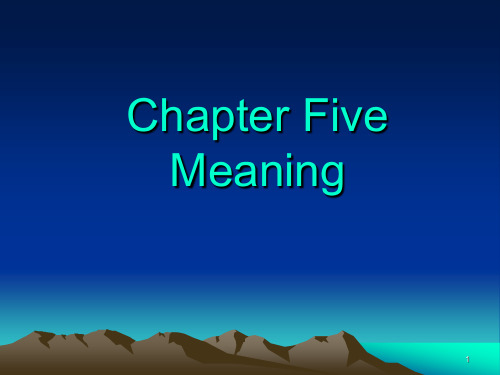
5. Sense & Reference
• Sense and reference are the two terms often encountered in the study of word meaning. They are two related but different aspects of meaning. • Sense– the inherent meaning of the linguistic form. It is the collection of all the features of the linguistic form. • Reference: What a linguistic form refers to in the real, physical world.
18
„Colorful‟ meaning
• Commendatory • tough-minded • resolute, firm • shrewd • childlike • wiseman • man of usual talent • portly, stout, solid, plum • slender, slim • • • • • • • • • Derogatory ruthless obstinate sly, crafty childish wiseguy freak fleshy, fat, tubby lean, skinny, lanky, weedy, scraggy
27
Differences:
• (1) • (2) • (3) linguistic forms having the same sense may have different references in different situations. e.g. I was once bitten by a dog. Mind you. There is a dog over there. Sometimes linguistic forms with the same reference might differ in sense. “朝阳” & “夕阳” “主任” &
英语语言学第五章semantics
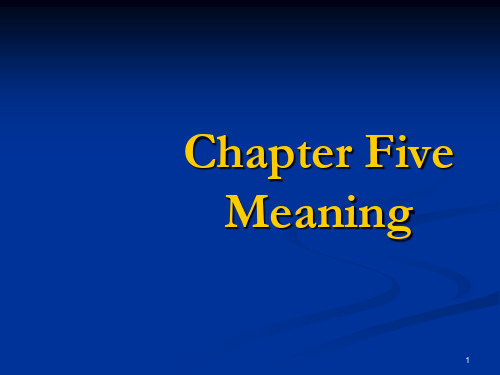
16
6.3 Complementary antonymy
The members of a pair complementary to each other. They divide the whole of a semantic field completely. The assertion of one means the denial of the other and the denial of one means the assertion of the other. There is no intermediate ground between the two. Distinction between gradable and complementary contrary and contradictory
3
3.2 Connotative meaning
the emotional association which a word or a phrase suggests in one’s mind. It is the supplementary value added to the purely denotative meaning of a word. Mother a female parent connotes love, care and tenderness. Dogs have different connotative meaning between Chinese and English.
9
3.7 Thematic meaning
determined by the order of the words and the different prominence they each receive.
语言学导论-第5章Semantics
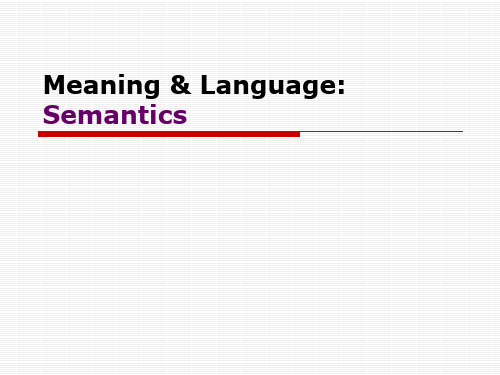
Lexical meaning: Reference & Sense
Reference 指称:
what a linguistic form refers to in the real physical world; dealing with the relationship between language and the world.
“dog”:
4-legged mammal, hairy, canine, definitely loyal
(newsworthy)
What is Meaning?
Scholars under different scientific backgrounds have different understandings of language meaning. Linguistic views:
The conceptualist view 概念论
The semantic triangle 语义三角
(Ogden & Richards 1923) Thought/Reference 思想/指称 (concept)
“dog”
Symbol/Form 符号/形式 (word/phrase/sentence)
Meaning & Language: Semantics
Definition
Semantics: the study of meaning in language.
It deals with the meaning of words (lexical semantics). And how meaning of sentences (compositional semantics) is derived from words.
语言学整理的资料Chapter 5 semantics
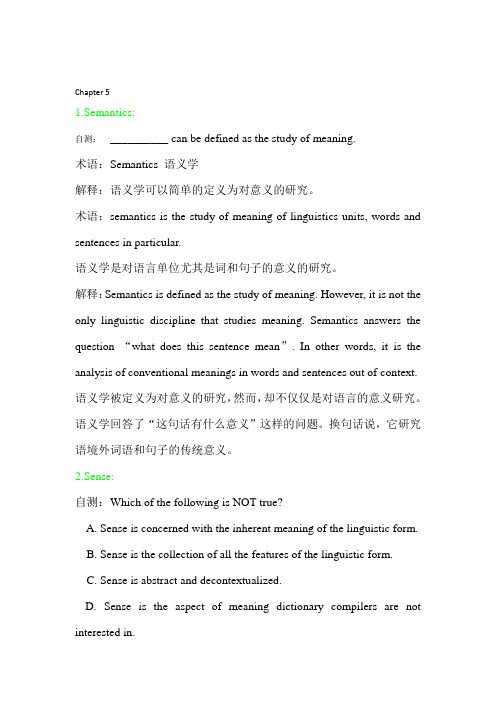
Chapter 51.Semantics:自测: __________ can be defined as the study of meaning.术语:Semantics 语义学解释:语义学可以简单的定义为对意义的研究。
术语:semantics is the study of meaning of linguistics units, words and sentences in particular.语义学是对语言单位尤其是词和句子的意义的研究。
解释:Semantics is defined as the study of meaning. However, it is not the only linguistic discipline that studies meaning. Semantics answers the question “what does this sentence mean”. In other words, it is the analysis of conventional meanings in words and sentences out of context. 语义学被定义为对意义的研究,然而,却不仅仅是对语言的意义研究。
语义学回答了“这句话有什么意义”这样的问题。
换句话说,它研究语境外词语和句子的传统意义。
2.Sense:自测:Which of the following is NOT true?A. Sense is concerned with the inherent meaning of the linguistic form.B. Sense is the collection of all the features of the linguistic form.C. Sense is abstract and decontextualized.D. Sense is the aspect of meaning dictionary compilers are not interested in.术语:Sense 涵义解释:涵义指一个实体的抽象属性。
新编简明英语语言学Chapter5Semantics语义学
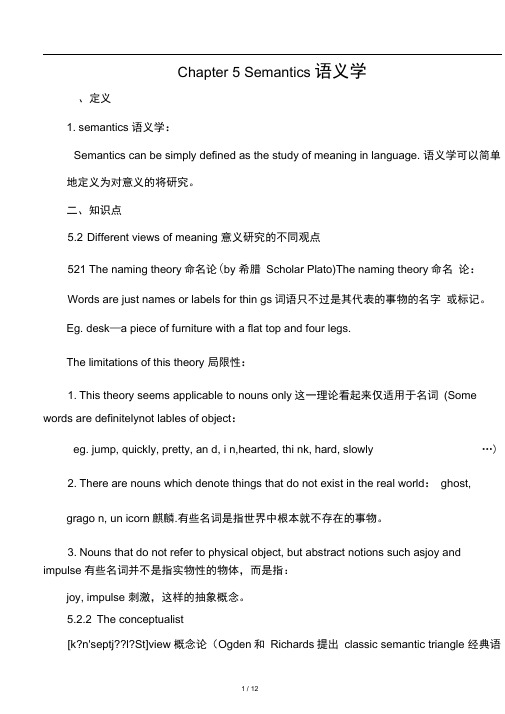
Chapter 5 Semantics 语义学、定义1. semantics 语义学:Semantics can be simply defined as the study of meaning in language. 语义学可以简单地定义为对意义的将研究。
二、知识点5.2 Different views of meaning 意义研究的不同观点521 The naming theory命名论(by 希腊Scholar Plato)The naming theory命名论:Words are just names or labels for thin gs词语只不过是其代表的事物的名字或标记。
Eg. desk—a piece of furniture with a flat top and four legs.The limitations of this theory 局限性:1. This theory seems applicable to nouns only这一理论看起来仅适用于名词(Some words are definitelynot lables of object:eg. jump, quickly, pretty, an d, i n,hearted, thi nk, hard, slowly …)2. There are nouns which denote things that do not exist in the real world: ghost,grago n, un icorn麒麟.有些名词是指世界中根本就不存在的事物。
3. Nouns that do not refer to physical object, but abstract notions such asjoy and impulse有些名词并不是指实物性的物体,而是指:joy, impulse 刺激,这样的抽象概念。
新编简明英语语言学 Chapter 5 Semantics 语义学

Chapter 5 Semantics 语义学一、定义1. semantics语义学: Semantics can be simply defined as the study of meaning in language. 语义学可以简单地定义为对意义的将研究。
二、知识点5.2 Different views of meaning意义研究的不同观点5.2.1 The naming theory命名论(by希腊Scholar Plato)The naming theory命名论: Words are just names or labels for things.词语只不过是其代表的事物的名字或标记。
Eg. desk—a piece of furniture with a flat top and four legs.The limitations of this theory局限性:1. This theory seems applicable to nouns only.这一理论看起来仅适用于名词(Some words are definitelynot lables of object: eg. jump, quickly, pretty, and, in, hearted, think, hard, slowly…)2. There are nouns which denote things that do not exist in the real world: ghost, gragon, unicorn麒麟. 有些名词是指世界中根本就不存在的事物。
3. Nouns that do not refer to physical object, but abstract notions such as joy and impulse. 有些名词并不是指实物性的物体,而是指:joy, impulse刺激,这样的抽象概念。
新编简明英语语言学教程05Chapter-5-semantics
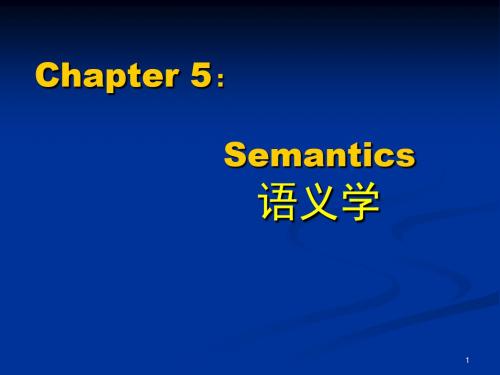
16
Note:
Linguistic forms having the same sense may have different references in different situations; on the other hand, there are also occasions, when linguistic forms with the same reference might differ in sense, e.g. the morning star and the evening star,
用符号或单词表示物体是通过言语者思 维中单词的形式与概念联系起来实现的。 从这个观点看,概念就是单词的意义。
9
Contextualism (语境论)
Meaning should be studied in terms of situation, use, context — elements closely linked with language behavior.
3
Naming theory (Plato)命名论
Words are names or labels for things.
词语只是代表物体的名字或标记。
Limitations:
1) Applicable to nouns only.
2) There are nouns which denote things that do not exist in the real world, e.g. ghost, dragon, unicorn, phenix…
语言学 第五章 semantics
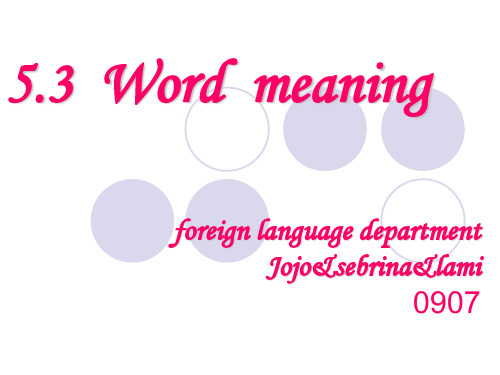
6 Collocative meaning()搭配意义
conscience
case
sky
clear
The associations a word gets because of the meanings of words which tend to occur in its linguistic context are called collocative meanings.
Thematic meaning is mainly a matter of choice between alternative grammatical • constructions. Tomorrow I plan to have an outing. I plan to have an outing tomorrow.
有意义,无指称
5.3.2 Leech’s seven types of meaning
Geoffrey Leech
From Wikipedia, the free encyclopedia Geoffrey N. Leech (Born 16 January 1936[1]) was Professor of Linguistics and Modern English Language at Lancaster University from 1974 to 2002. He then became Research Professor in English Linguistics. He has been Emeritus Professor in the Department of Linguistics and English Language, Lancaster University, since 2002.
- 1、下载文档前请自行甄别文档内容的完整性,平台不提供额外的编辑、内容补充、找答案等附加服务。
- 2、"仅部分预览"的文档,不可在线预览部分如存在完整性等问题,可反馈申请退款(可完整预览的文档不适用该条件!)。
- 3、如文档侵犯您的权益,请联系客服反馈,我们会尽快为您处理(人工客服工作时间:9:00-18:30)。
4.2.3 Converse(反向)~ –E.g. give vs. receive; husband vs. wife.
4.4 Homonymy
Sound Spelling Meaning Example
Concept
word
thing
2.4.2 Sense and Reference
• Sense is concerned with the inherent meaning of linguistic form. It is the collection of all the features of the linguistic form; it is abstract and decontextualized.
1)Innocent—guilty 2)Borrow—lend 3)Strong-weak 4)Furniture—desk 6)Knight—night 7)Autumn—fall
Homophon#43;
Homonym +
+
-
Night vs. Knight
-
Lead vs. Lead
-
Bank vs. Bank
4.5 Hyponymy
Furniture Super-ordinate
Desk
Table
Bed
Co-hyponyms
Exercises
• Tell the sense relations of these pairs of words
• Reference means what a linguistic form refers to in the real, physical world; it deals with the relationship between the linguistic element and the non-linguistic world of experience.
2.1 Seven types of meaning by G. Leech 2.2 Naming theory(名命论) 2.3 Contextualism(语境论) 2.3 Behaviorism(行为主义理论) 2.4 Conceptualism(概念论)
2.1 Seven types of meaning
contexts which include situational context and linguistic context;
2.5 Behaviorism
• Founder: Bloomfield; • Idea: meaning is the situation in which the
Meaning Word Meaning Sentence Meaning Lexical Meaning Grammatical Meaning Conceptual Meaning Associative Meaning Thematic Meaning
2.2 The Naming Theory
Semantics
Contents
I. Definition of Semantics II. Meanings of MEANING III. Conceptualism IV. Sense Relations V. Componential Analysis VI. Sentence Meaning
I. Definition of Semantics
• Semantics is a branch of linguistics on the study of meaning which consists of word meaning and sentential meaning.
II. Meanings of MEANING
speaker utters it and the response it calls forth in the hearer, (说话者的语境和听话者的反应)
2.4 Conceptualism
• Founder: Ogden and Richards; • Idea: there is no direct link between a
linguistic form and what it refers to; rather, a concept in the mind, i.e. the meaning of a word is its concept.
2.4.1 Semantic Triangle
• A theory proposed by Ogden and Richards, which argues that the relation between a word and a thing it refers to is not direct. It is mediated by concept.
IV. Sense relations between words
4.1 Synonymy(同义); 4.2 Antonymy(反义). 4.3 Homonymy(同形/同音异义); 4.4 Hyponymy(上下义);
4.1 Synonymy
4.2.1 Stylistic(文体)synonyms;
– E.g. old man, daddy, dad, father, male parent;
4.1.2 Dialectal(方言)synonyms;
– E.g. autumn vs. fall;
4.2 Antonymy
4.2.1 Gradable(等级)antonyms: –E.g. good vs. bad; long vs. short;
• Founder: Aristotle and Plato; • Idea: words are just names or labels in things;
2.3 Contextualism
• Founder: Firth; • Idea: meaning can be derived from observable
